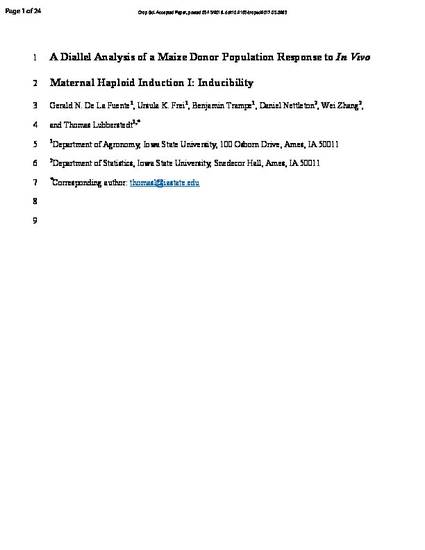
The maize in vivo maternal doubled haploid (DH) system is an important tool used by maize breeders and geneticists around the world. The ability to rapidly produce DH lines of maize for breeding allows breeders to quickly respond to new selection criteria based on the ever changing biotic and abiotic stresses that maize is subjected to across its growing area. There are two important steps in the generation of DH lines using the in vivo maternal DH system: 1) the production and identification of haploid progeny, and 2) the doubling of genomes to create fertile, diploid inbred lines that can be used for topcross and per se evaluation. For this study, the focus is the first step, the production and identification of haploid progeny. A diallel mating between six inbred lines of maize, three highly inducible lines (CR1HT, PA91HT1, WF9) and three lines with low inducibility (NK778, A427, A637) was produced to study the genetic makeup of inducibility in temperate maize germplasm. A maximum estimated rate of inducibility was found in A427/A637 at 14.6%. Significant general combining ability (GCA) specific combining ability (SCA), reciprocal (REC), environmental (ENV), as well as GCA by ENV and SCA by ENV interactions were found. Misclassification rates ranged from 0-45.2% in the 30 hybrids considered. This study supports the use of germplasm with improved inducibility for breeding to improve rates of inducibility in germplasm which has low induction rates.
Available at: http://works.bepress.com/thomas-lubberstedt/87/

This is a manuscript of an article published as Gerald N. De La Fuente, Ursula K. Frei, Benjamin Trampe, Daniel Nettleton, Wei Zhang, and Thomas Lubberstedt. A Diallel Analysis of a Maize Donor Population Response to In Vivo Maternal Haploid Induction I: Inducibility. Crop Science (2018), doi: 10.2135/cropsci2017.05.0285